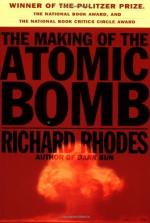|
This section contains 1,413 words (approx. 4 pages at 400 words per page) |

|
Chapter 13 "The New World" Summary
In 1941, Enrico Fermi's Columbia University team (Fermi, Szilard, Anderson and others) works to develop nuclear fission through a slow-neutron chain reaction in uranium while the United States Government debates funding for the atomic bomb. Scientists at Berkeley isolate plutonium. Szilard, now on the Columbia payroll, works to procure supplies of purified uranium and graphite. That summer, the Columbia team assembles the largest uranium-graphite lattice ever devised. They have yet to determine how much natural uranium plus the graphite moderator are necessary to create a self-sustaining chain reaction. Fermi names the structure a "pile" (page 395,) synonymous with heap.
Many of nuclear science's standard terms are developed during this time period. They move their huge experiment to Schermerhorn Hall and enlist Columbia's football players to stack the 50 and 100 pound packs of graphite and uranium into a cubical...
(read more from the Chapter 13 "The New World" Summary)
|
This section contains 1,413 words (approx. 4 pages at 400 words per page) |

|




